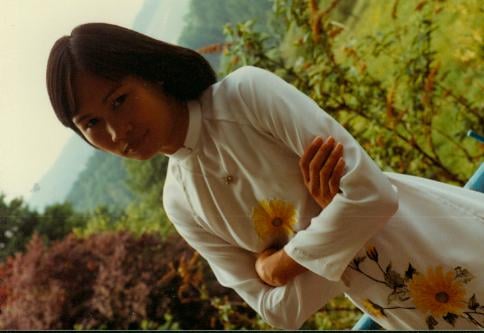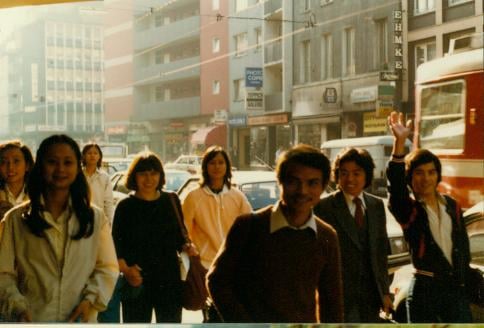“The Cap Anamur was our saviour, it had given us a second chance at life, a rebirth. We had to repay the German people for their help.”
[Image 1]: Hue Le
[Image 2]: Tuyet (second from left) and friends.
[Hue]: Our first attempt, it was the entire family that tried to leave. My parents, and five siblings all went to the village to see if we could get onto the boat, but when we arrived I saw police all over the beach with their prisoners. I’ll never forget that scene: the armed policemen, the sound of those two stroke coast guard boat engines, the moonlight on the pier.
As we fled the scene, we were taken in by a family. The mother of the family worked for my mother as a seamstress, and her husband was a veteran who was sent to the re-education camps. They saved us, and I am forever grateful. I can’t remember their names, but I wish I could meet them again and repay them. The people who lived in these small villages always knew those who came from the city to become Boat People (they could tell from our lack of a tan that we were from the city). But no one revealed to the authorities that we were there that night, and so we came back to Saigon the next day as if nothing had happened.
My father had used most of our money trying to get us out of the country on that boat. We only had enough for one more trip and my parents wanted to get their children out of the country. Me and the oldest sister would go, as well as my younger brother who was at the age of conscription (and about to be sent off to fight in Cambodia.) After thinking it over, they decided to send Tuyet as well.
They wanted to keep the youngest daughter in Vietnam with them but soon rethought that as well. At the time, many families were keeping their children close because leaving the country was so dangerous, and so it was both courageous and wise for my parents to decide to send my youngest sister with us. She was only 14 at the time, and though the decision was hard, it would ultimately pay off; because she was so young when she arrived in Germany, the government worked to sponsor my parents over to reunite them with her and make sure the family would not be broken.
The second time, my father went to send us off and my mother stayed at home. We went to another village to wait for the boat, there you were to meet guides who would take small groups separately down to the big boat. If you got separated here, that was it. We were lucky because we ran into the helmsman of the boat, a man who used to work for the old regime. He was short, and plump, I remember. We followed him onto a junk as it passed through the small rivers, the rain hitting the small wooden bridges as we went under them. I stayed low and hidden in the junk to avoid detection. We made our way across land; the night was pitch black and I couldn’t see. I still can’t remember the path or any of the landscape we took, all I can remember is staying two or three meters behind the helmsman, following in his tracks.
All five of us siblings had been separated on the way down to the boat. But another stroke of luck: we all made it to the boat together. Many people who made it this far were tragically separated from their families. I remember days later when we arrived at the island, a man and his son opened their luggage only to find his wife’s clothes inside; his wife had been separated from them and must’ve had his things! Another helmsman realized on the small junks that his wife and family weren’t with him, and so he got his group out to the big boat before going back for them.
Five days and four nights. That last night, we came upon a beautiful ocean scene, dashing blue dolphins playing in the blue sea, dancing jelly fish. We came upon an oil rig, they gave us some water and fruit and told us to stay there with them. We were drinking water from our oil cans at this point. But everyone on the boat had their sights set on Singapore, and we decided to move on. We didn’t know Singapore was not taking refugees anymore at the time.
That night, I remember all of a sudden frantic activity, people tying ropes, trying to stabilize the ship. Looking out across the dark oceans, I could see streaks of silver, the tops of waves as they crashed towards us. A massive storm was coming towards us.
[Tuyet]: It started to tear our boat apart, soon the engine was dead and the nose broken. We strapped ourselves in because we were rocking so much.
My uncle and aunt had their four year old son with them, and I remember my uncle losing hope. He asked my young sister for sleeping pills, so that he could avoid seeing his wife and children die.
I can’t remember how much time passed, but suddenly in the distance, I saw a tower, a beacon with light shining from it. A Vietnamese voice: “Please moor your boat with ours!” I was filled with both fear and relief, who were our saviours? Were they communist police?
We had no choice, our fate was in the hands of our mysterious saviours. They threw down rope ladders for us to climb up, telling us clearly to leave everything behind for now. For those too weak, some Filipino deckhands came down to carry them up.
The next morning, a Vietnamese man told me that we were on board a German boat: the Cap Anamur. The ship was on a humanitarian mission to save refugees in the South China Sea. They called us up to take any belongings still in the old boat, and witness the process of breaking and sinking it, a sort of final rite of passage of leaving our old lives behind.
The captain of the ship showed us four boats circling us on the Cap Anamur. He said, they were pirates. In that sortie, he had already saved four boats, and they had intended to leave that night because they could see the storm coming. Their helicopter had already left for Singapore. But it was the captain’s sixth sense to wait for another day, just in time to save us. Like an invisible hand guiding him.
Because Singapore was not taking any more refugees, we stayed on the boat when the Cap Anamur anchored in Singapore. I took all of the money that my parents had given me, and gave it to the Filipino deckhands to send back home. We headed for Palawan in the Philippines, an island. The boats before us had headed straight for Germany, but because we were so many, the camp in the Philippines was to be our layover. Almost everyone decided to go to the United States, just 24 of us decided to go to Germany.
[Editor’s Note]: In the recording, Tuyet and Hue will refer to their cohort as “Cap Anamur IX”. Every time the ship left for the South China Sea, the cohort that it would go on to save as well as that sortie, would be numbered. There were several Cap Anamur ships; here Tuyet and Hue refer to Cap Anamur I as the one that saved them. Cap Anamur II would go out some time in 1981.]
[Tuyet]: We were 125 total in the boat together, packed in like sardines. When the Cap Anamur found us, the nose of our boat had been destroyed by the waves, we were strapped in, and our engine was dead. If the Cap Anamur had not found us when they did, I would not be sitting here now.
At the time we had family in the United States, so going there was completely possible with time. But the Cap Anamur was our saviour, it had given us a second chance at life, a rebirth. We had to repay the German people for their help.
[Hue]: When they left us on the island, the Captain of the Cap Anamur told us that any photos that we took on the ship, don’t send them back to Vietnam. Any information the Coast Guard of Vietnam got about Cap Anamur’s routes would make his job more difficult. he wanted to hide from the Vietnamese Coast Guards so he could save more boats.
We were on the island for 3 months studying German. My uncle was a soldier with the Cong Hoa (Republic) regime, so he wanted to go to the US like some other refugees who were having second thoughts. But the international community had decided at that point that whatever country took on the endeavour of saving these refugees, would also take on the responsibility of taking them into their home.

